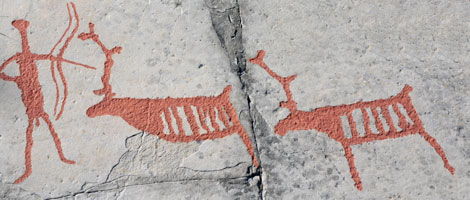Background
Why HUNT?
Hunting is but one example of the many interactions between man and nature that affects biodiversity, encompassing a wide range of socioeconomic, cultural and environmental contexts. With sustainable use of biodiversity being a central issue on the global agenda HUNT is a timely project, integrating the social, economic and ecological elements of hunting with policy makers and exploring the potential for new biodiversity conservation options.
How we use and manage the world’s natural resources is a subject that crosses many disciplines, regions, and levels of governance. In spite of an increasing recognition of the value of well managed hunting as a conservation tool, it is clear that the development of sustainable management practices require an integrated approach drawing from both the social and natural sciences, building on both academic and experience based knowledge.
What is hunting?
Hunting is a long-standing tradition that dates back to prehistoric times, when man had no other option than to hunt for subsistence. Images of early human hunting practices are depicted in cave paintings and engravings across the world. But what is the role of hunting in the 21st century? After all, isn't this the era where children believe that the foods they eat originate from the supermarket?
 Photo: J. Linnell
Photo: J. Linnell
Hunting in the 21st century
In the developed world today’s hunting is normally strictly controlled through hunting permits and regulated hunting grounds. The act of hunting involves as many hunting techniques as there are species to hunt; guns, snares, dogs, bow and arrows to name but a few. And there are possibly as many arguments for hunting as there are hunters.
Outdoors men are attracted by the ideal of entering into untouched wilderness, while gastronomes refer to the prospect of genuinely ecological food. Some refer to hunting as a lifestyle and tradition, appreciating skills handed down from their forefathers. Others again enjoy the social aspect and the feeling of fellowship in a hunting community. Hunting for subsistence is still an essential way of living in many developing countries and for certain indigenous populations. On the other side you have the poachers, taking risks for money, the excitement, or perhaps a valuable trophy. Legal trophy hunters may have a similar motivation for the hunt, but possibly a cleaner conscience.
Hunting encompasses a wide range of socioeconomic, cultural and environmental contexts. And the fact that hunting involves the killing of animals often leads to tension between different sectors of society. The legitimacy of hunting is also affected by many factors that may appear unrelated to the killing of animals such as development trends in rural areas and cultural shifts reflecting large-scale societal changes. In other words, hunter or not, apparently no one is left with an unbiased viewpoint on hunting. The two extremes are usually depicted as the ardent hunter and the dedicated animal rights activist. In between there are landowners, management, suppliers, hikers, sheep farmers, worried parents and many “normal” people.
 Photo: O. Strand, J. Linnell
Photo: O. Strand, J. Linnell
A need for HUNT?
In order to mitigate conflicts and to ensure the legitimacy of management regimes aimed at sustainable hunting practices it is essential to grasp all these mechanisms that lead to an increasing polarization between interest groups. By using hunting as a lens, HUNT investigates general aspects of the relationship between humans and nature. Examining the wider issue of how people interact with biodiversity, and seeking ways to reconcile conflicts between people over hunting practices.
 Photo: P. Jordhøy
Photo: P. Jordhøy
New knowledge, improved management
At present our knowledge regarding hunting and biodiversity is mostly limited to single disciplinary, or single area, case studies, as few interdisciplinary studies specifically address the issue of hunting in relation to biodiversity in a comparative manner. Over a period of three years HUNT will bring together four different study disciplines through separate work packages; sociology, political science, economy and ecology in order to reduce this knowledge gap, exploring the wider meaning of hunting.
-A highly original approach that will lead to increased understanding between research disciplines that are commonly isolated, and an integrated perspective on the role of hunting in a number of European and African countries.